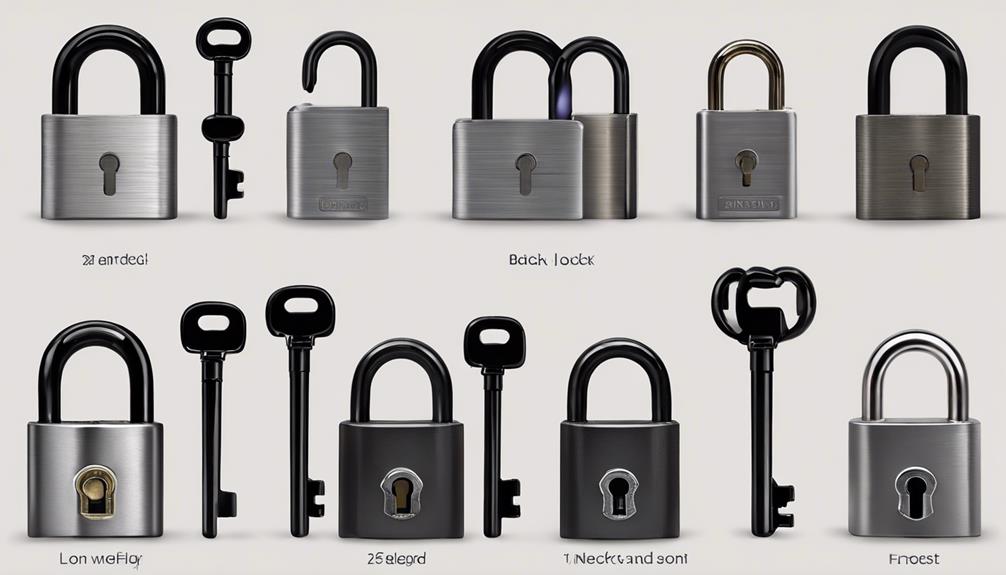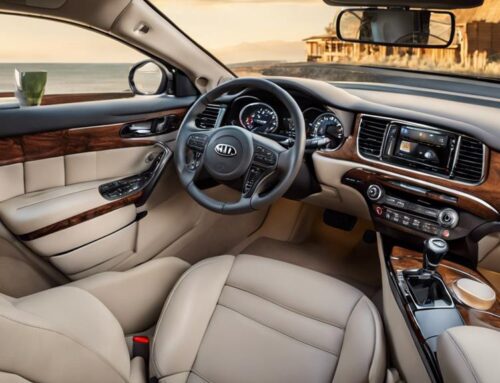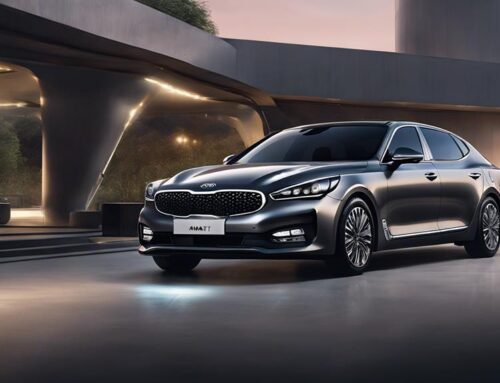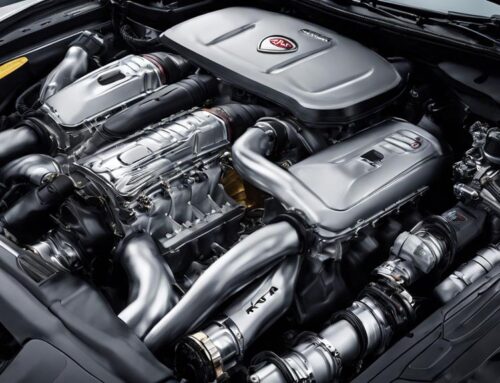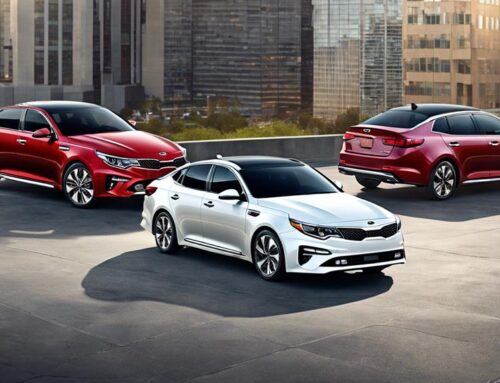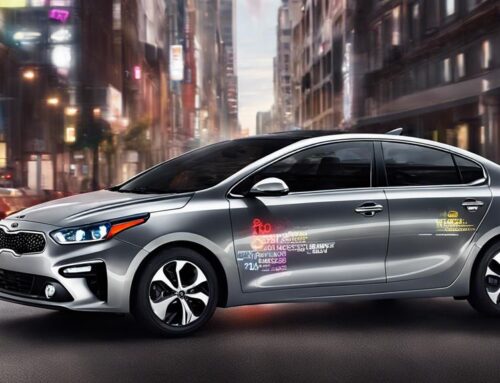When deciding between budget and premium locks, it's essential to grasp the variances in security grades, durability, and features. Confirm your property's safeguard meets your specific requirements and financial boundaries by recognizing these disparities. Premium locks offer higher security grades, enhanced durability, and advanced features, ideal for properties with increased security needs. Conversely, budget locks provide adequate protection while balancing cost constraints. By comprehending these distinctions, you can make an informed decision that aligns with your security priorities and budget considerations. Familiarizing yourself with these differences will assist you in making the right choice for your property's safety and security.
Key Takeaways
- Grade 1 locks offer highest security for commercial properties.
- Grade 2 balances cost and security for residential use.
- Premium locks feature advanced technology like biometrics and smart features.
- Budget locks provide basic security at a lower cost.
- Consider long-term costs and maintenance needs when choosing between budget and premium locks.
Lock Security Grades
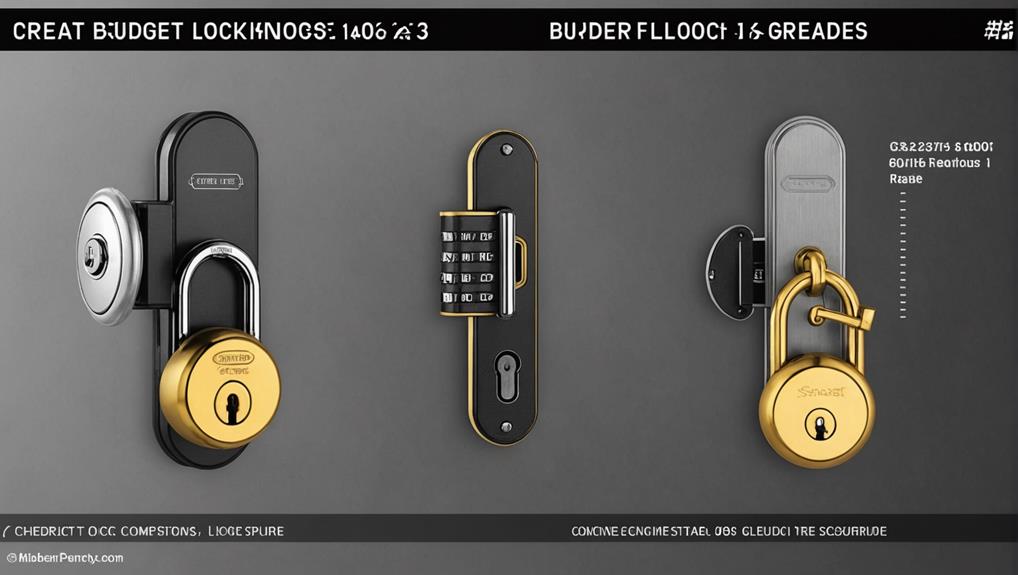
When selecting a lock for your property, understanding the different security grades is essential. Lock security grades, ranging from Grade 1 to Grade 3, indicate the level of durability and resistance to forced entry.
Grade 1 locks offer the highest security, with the ability to withstand 800,000 cycles and 360 pounds of force, making them ideal for high-security applications like commercial properties and government buildings.
On the other hand, Grade 2 locks provide a balance between cost and security, enduring 250 pounds of force and 400,000 cycles, suitable for most residential and light commercial uses.
Grade 3 locks, with the lowest security level, are designed for low-risk residential settings, enduring 200,000 cycles and 150 pounds of force.
To make the right choice, consider factors such as the best locks for residential properties and the specific needs of your environment.
When considering lock security grades, it's vital to assess your property's security needs, traffic volume, and budget constraints. Higher grades typically offer better durability and security features, ensuring the protection of your property.
Types of Residential Locks
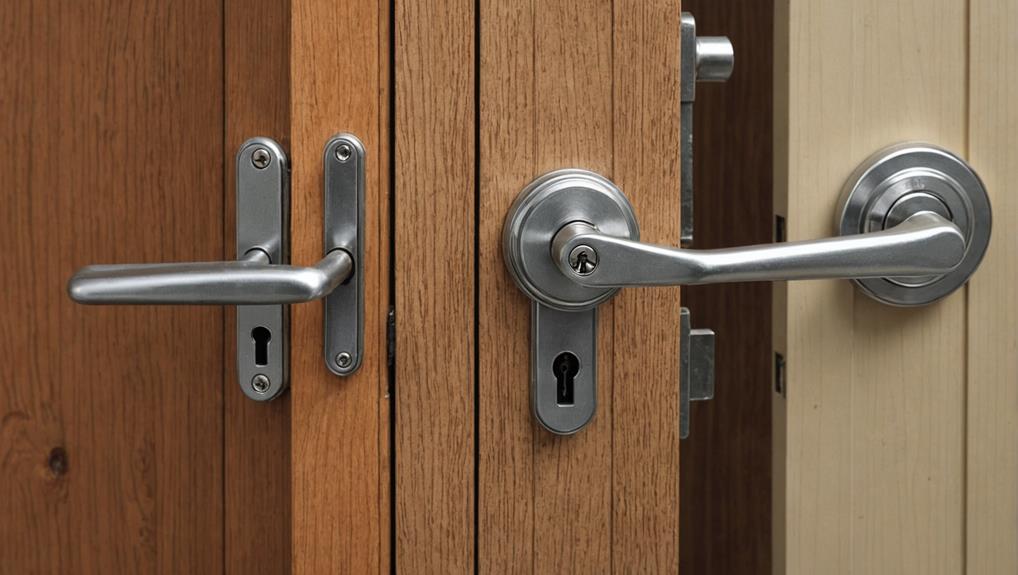
For residential properties, various types of locks are available to suit different security needs and preferences.
When comparing locks, key-in-knob locks are basic and often used alongside deadbolts for standard security. Deadbolts, in single or double cylinder options, provide enhanced security against forced entry and are ideal for exterior doors.
Entry handlesets, combining tubular locks and deadbolts, offer convenience and added security, making them a popular choice for front doors. Mortise locks, requiring professional installation, are strong and recessed, commonly used in high-security applications due to their durability.
Smart locks are gaining popularity for residential use, providing keyless entry, remote access, and features like access logs and integration with home security systems.
It's also essential to take into account locks for interior doors, gates, and windows to guarantee thorough home security.
When choosing affordable locks, reflect on the level of security needed for your home and the premium lock features that best meet your requirements.
Factors for Lock Selection
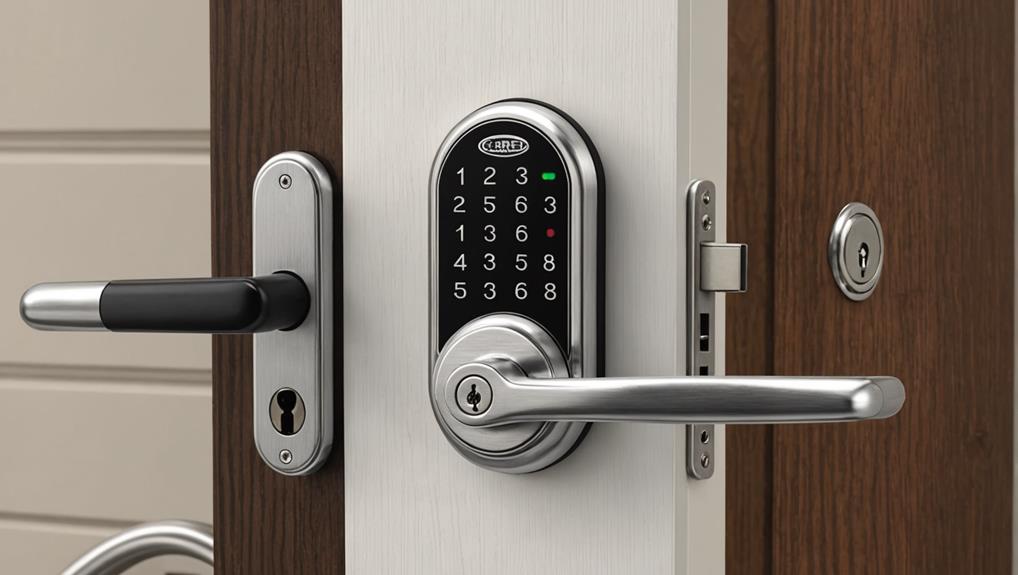
Types of residential locks offer varying levels of security and functionality. When selecting a lock, several factors should guide your decision to guarantee you find the right balance between security and convenience.
- Consider Security Grade: Opt for Grade 1 locks for maximum resistance in high-security areas, while Grade 3 locks suit low-risk environments. High-security locks often incorporate advanced materials and technologies that enhance their durability and resistance to tampering.
- Assess Compatibility: Confirm the lock fits your door type and material for proper installation; some locks may require professional fitting.
- Account for Budget Constraints: Balance your home security needs with your budget limitations; premium locks offer advanced features but basic options can also provide security on a budget.
- Evaluate Aesthetic Preferences: Choose a lock finish and design that complements your home's overall look and style.
Remember to weigh the installation and maintenance requirements as well.
Key Technologies and Innovations
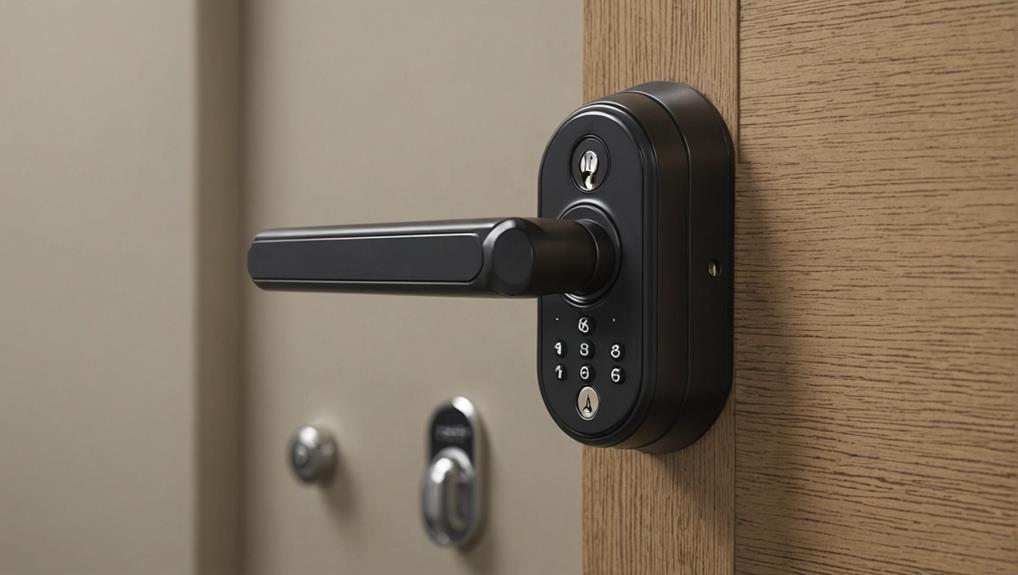
When choosing between budget and premium locks, considering key technologies and innovations is essential.
Advanced security features like biometric access and tamper alarms offer heightened protection against intruders. For instance, many of the top smart locks on the market include features such as voice control and remote access, enhancing both security and user experience.
Connectivity enhancements, such as smart lock integration with home automation systems and electronic fobs for keyless entry, add convenience and peace of mind to your security setup.
Advanced Security Features
Among the key technologies and innovations in advanced security features for locks are keyless entry systems, biometric locks, electronic fobs, and integration with home automation systems.
These advancements provide enhanced convenience, flexibility, and security for users:
- Keyless Entry Systems: Keyless entry options like keypads and smartphone apps eliminate the need for traditional keys, reducing the risk of lost or stolen keys and enhancing overall security.
- Biometric Locks: Utilizing fingerprint or retinal scanning, biometric locks guarantee that only authorized individuals can access a property, adding an extra layer of security.
- Electronic Fobs: Electronic fobs can be programmed for temporary access, perfect for guests, and can be deactivated remotely if misplaced, offering peace of mind and efficient security management.
- Integration with Home Automation Systems: Smart locks that integrate with home automation systems allow users to control various devices from a single platform, streamlining security and accessibility within the home.
Connectivity Enhancements
With the increasing demand for seamless integration and enhanced connectivity in smart home security systems, the focus has shifted towards innovative technologies that streamline user experience and bolster overall security measures.
The latest smart locks are now directly connecting to WiFi, eliminating the need for hubs and simplifying smart home integration. Innovations in fingerprint sensors enable keyless access, enhancing security and user convenience.
Retrofit smart locks have become smaller and more compact, making installation easier without compromising existing deadbolts' functionality. Thread technology, with its low-power wireless networking capability, allows devices to connect directly to the internet, improving overall smart home connectivity.
Furthermore, modern locks feature user-friendly designs that cater to consumer preferences for discreet and aesthetically pleasing home security solutions.
These connectivity enhancements not only make smart locks more convenient but also enhance the overall security of your home.
Understanding Lock Grades
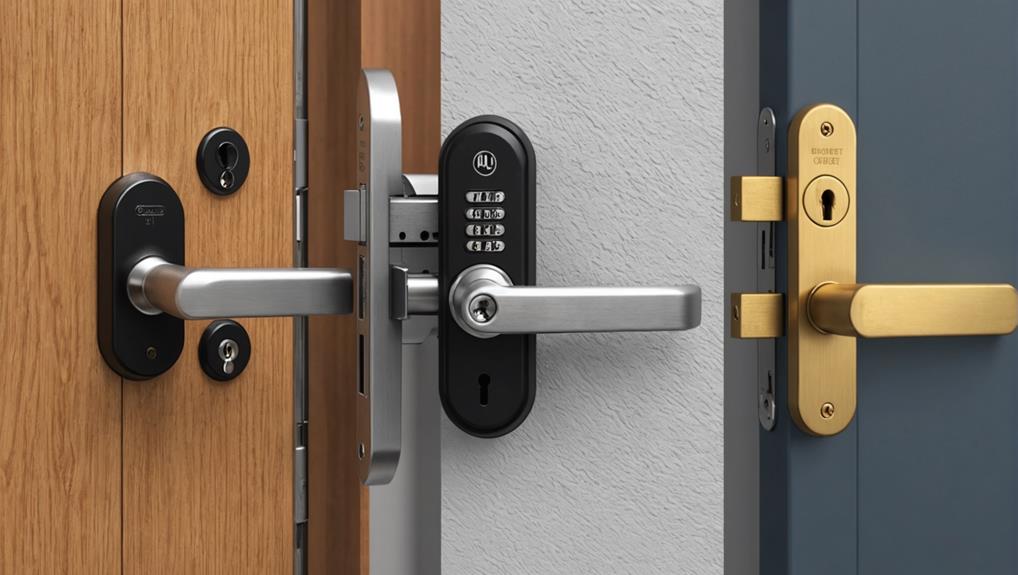
You should understand the importance of lock grades when considering the security of your property.
Residential lock types often fall under Grade 2 or Grade 3 categories, depending on the level of security needed.
Choosing the Best Lock for your home involves examining these grades carefully.
Lock Grade Importance
Understanding lock grades is vital when it comes to selecting the right security solution for your property. The ANSI/BHMA grading system categorizes locks into three grades, each offering varying levels of security and durability:
- Grade 1: These locks are built for high-security needs, enduring significant cycles and force, making them suitable for commercial properties and high-traffic areas.
- Grade 2: Providing moderate resistance, these locks are ideal for residential and light commercial use, offering a balance between security and cost effectiveness.
- Grade 3: Offering basic security, these locks are recommended for low-risk areas or interior doors, withstanding a lower level of cycles and force compared to Grade 1 and 2.
- Selecting the appropriate lock grade is essential as it guarantees that your property's security aligns with its risk level, usage, and budget considerations.
Residential Lock Types
Lock grades play an essential role in ensuring the security and durability of your property's locks. Understanding the ANSI/BHMA grading system helps you make informed decisions when selecting residential locks. Here's a breakdown of the different lock grades and their suitable applications:
| Lock Grade | Security Level | Durability | Ideal Use |
|---|---|---|---|
| Grade 1 | High | 800,000 cycles, 360 lbs force | Commercial properties, high-traffic areas |
| Grade 2 | Medium | 400,000 cycles, 250 lbs force | Most residential, light commercial settings |
| Grade 3 | Basic | 200,000 cycles, 150 lbs force | Low-risk residential areas, interior doors |
When choosing a lock grade for your home, consider factors such as the area's crime rate, the amount of foot traffic, and your budget. Opting for Grade 1 or 2 locks in higher-risk locations can provide added security, while Grade 3 locks may suffice for lower-risk residential areas. Make sure to assess your specific needs to select the appropriate lock grade for your residential property.
Lock Grade Applications
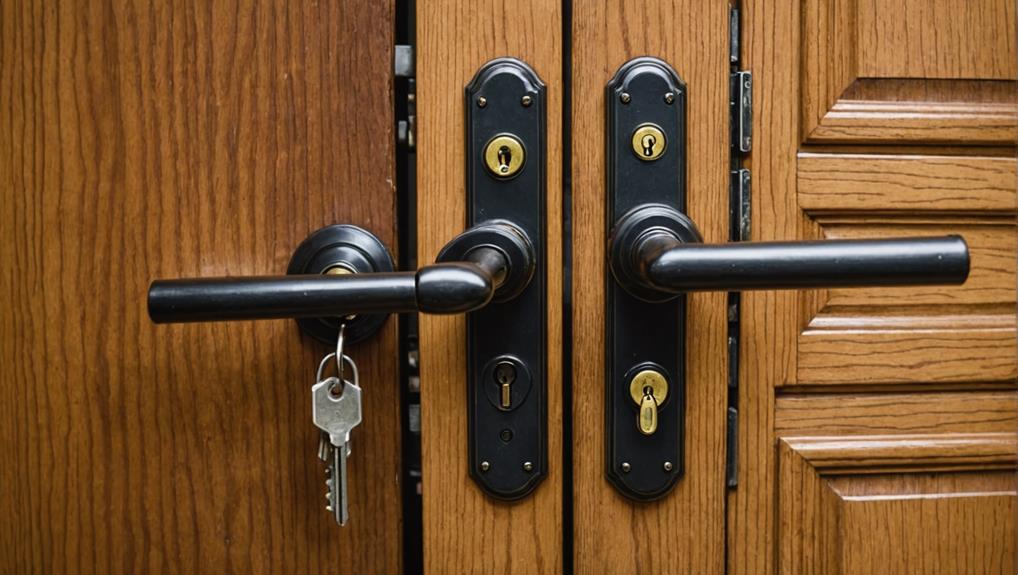
When selecting a lock for your property, the grade of the lock plays an essential role in determining its suitability for different applications. Understanding the applications for each lock grade can help you make an informed decision:
1. Grade 1 Locks: Ideal for high-security applications like commercial properties, withstanding up to 800,000 cycles and 360 pounds of force, making them perfect for high-traffic areas.
Additionally, these locks often feature advanced mechanisms that are resistant to picking and drilling, guaranteeing maximum security.
2. Grade 2 Locks: Offering a balance of security and cost, suitable for most residential and light commercial applications, enduring 250 pounds of force and 400,000 cycles.
High-security locks designed for residential use often fall into this category, providing an effective deterrent against break-ins.
3. Grade 3 Locks: Primarily used in residential settings for low-traffic areas, designed to endure 200,000 cycles and 150 pounds of force, making them less suitable for high-security needs.
4. High-Crime Locations: Install Grade 1 or Grade 2 locks to guarantee enhanced security and durability against forced entry.
Factors for Lock Grade Selection
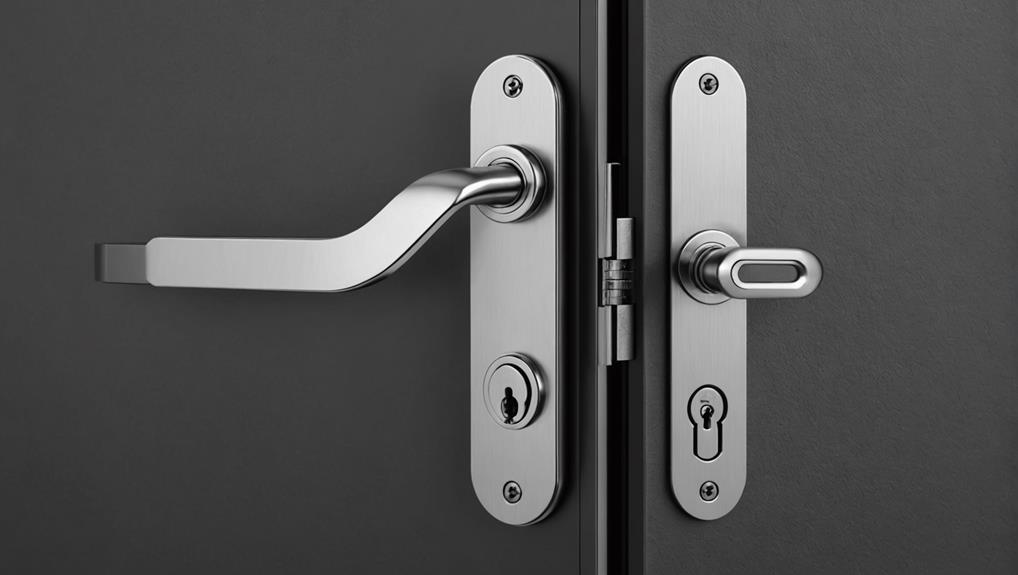
In determining the appropriate lock grade for your property, several key factors come into play that can guide your decision effectively.
To begin with, consider the security needs of your location. For high-crime areas, Grade 1 locks provide maximum protection and durability.
Next, assess the expected traffic volume; Grade 1 or 2 locks are more suitable for high-traffic areas due to their ability to withstand increased cycles and force.
Additionally, it's valuable to compare deadbolts vs. smart locks to understand which best meets your security demands and convenience needs.
Your budget is another important factor influencing lock grade selection, as higher-grade locks offer enhanced security features but come at a premium.
Additionally, evaluate installation requirements, especially for more complex higher-grade locks that may need professional installation.
Finally, consider future-proofing by investing in advanced technology options like smart locks in Grade 1 or 2 categories to enhance security and convenience over time.
Installation and Maintenance Considerations
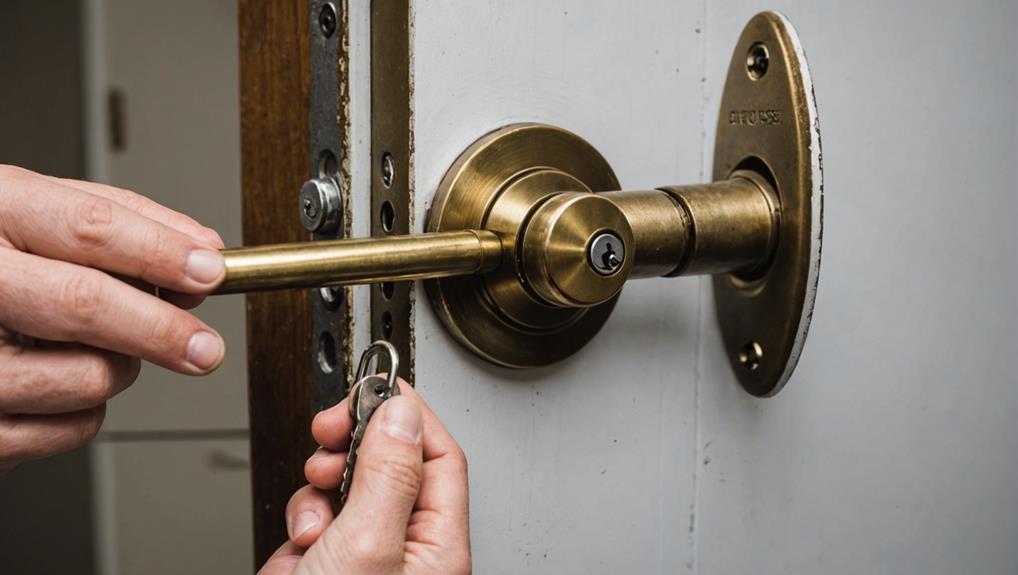
For a seamless experience with your chosen lock, it's essential to contemplate the installation and maintenance requirements. Here are some key considerations to keep in mind:
- Installation Process: Budget locks usually offer simpler installation procedures, making them suitable for DIY enthusiasts. On the other hand, premium locks may require professional installation due to their sophisticated mechanisms. This can be particularly true for high-security locks, which often feature advanced technology and specialized components.
- Maintenance Needs: Budget locks may need more frequent maintenance due to their lower-grade materials, leading to quicker wear and tear. Premium locks, however, are designed for durability and typically require less maintenance over time.
- Long-Term Cost: While premium locks come with higher upfront costs, their longevity and reduced need for replacements can make them a more cost-effective choice in the long run, offsetting the initial investment.
- Warranties: Premium locks often include warranties that cover installation issues or defects, offering additional peace of mind that may not be provided with budget locks.
Smart Lock Solutions
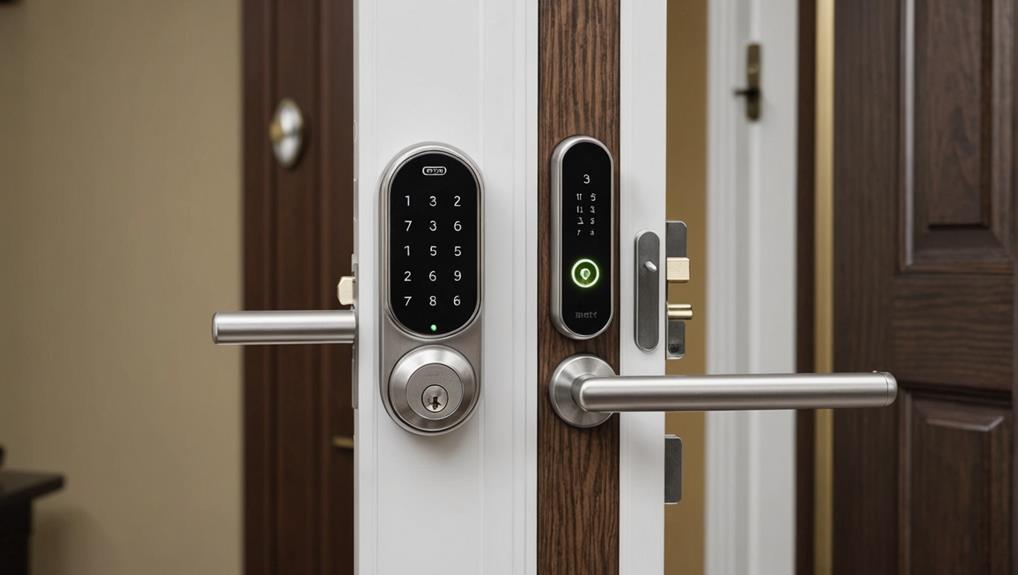
Considering the evolving landscape of home security, it's evident that smart lock solutions are becoming increasingly popular for modern homeowners.
Smart locks offer keyless entry options, utilizing technologies like Bluetooth, Wi-Fi, and biometric sensors for convenient and secure access to homes. Many smart locks can retrofit existing deadbolts, allowing you to maintain original keys while enjoying modern features such as remote control and auto-unlocking.
Enhanced connectivity through Thread technology enables direct internet connection without extra hubs, enhancing efficiency in smart home systems. In addition to these features, integrated alarms can further augment the security provided by smart locks, offering real-time alerts and notifications.
Premium smart locks provide security features like tamper alarms, access logs, and integration with home security systems for added peace of mind. The smart lock market rapidly evolves, prioritizing user-friendly designs and aesthetics to cater to consumer preferences for home security solutions.
Embrace the convenience and security smart locks offer, making your home safer and more accessible.
Frequently Asked Questions
Are Expensive Door Locks Worth It?
When considering if expensive door locks are worth it, think about the added security they provide.
Premium locks offer advanced features like anti-pick and biometric access, ensuring better protection against intruders.
Investing in these high-quality locks can save you money in the long run due to their durability and lower maintenance needs.
Plus, they could even lead to reduced home insurance costs.
Prioritize security by choosing quality locks for peace of mind.
Are Expensive Locks More Secure?
Yes, expensive locks are more secure. They use advanced technologies like anti-pick and anti-drill mechanisms, making them harder to break into.
Grade 1 locks are durable and can withstand significant force. Premium locks often use solid materials for better durability.
Some have smart features for added security. While they may cost more upfront, they offer long-term benefits and superior protection for your property.
What Is the Best Grade for Locks?
For the best lock grade, consider your security needs.
Grade 1 locks offer top-tier protection for high-risk areas like banks.
Grade 2 strikes a balance for most homes and light commercial spaces.
Grade 3 suits low-risk settings with basic security needs.
Pick based on property risk, traffic, and budget to guarantee the right level of security.
What Is the Difference Between Grade 1 and Grade 3 Deadbolts?
Grade 1 deadbolts offer top-tier security, enduring 800,000 cycles and resisting 360 pounds of force, ideal for high-risk areas.
Conversely, Grade 3 deadbolts provide basic security, lasting 200,000 cycles and resisting 150 pounds of force, suitable for low-risk spaces.
Grade 1 locks feature advanced anti-pick, anti-drill, and anti-bump tech, while Grade 3 locks lack such features.
ANSI/BHMA rates Grade 1 as the most durable, suitable for high-security needs.
Conclusion
Overall, when choosing between budget and premium locks, it's important to evaluate factors such as security grade, type of lock, and key technologies. While budget locks may be cost-effective, premium locks often offer higher levels of security and durability. Ultimately, the choice between budget and premium locks will depend on your individual needs and preferences. Assess all the factors discussed to make an informed decision that best suits your home security needs.

